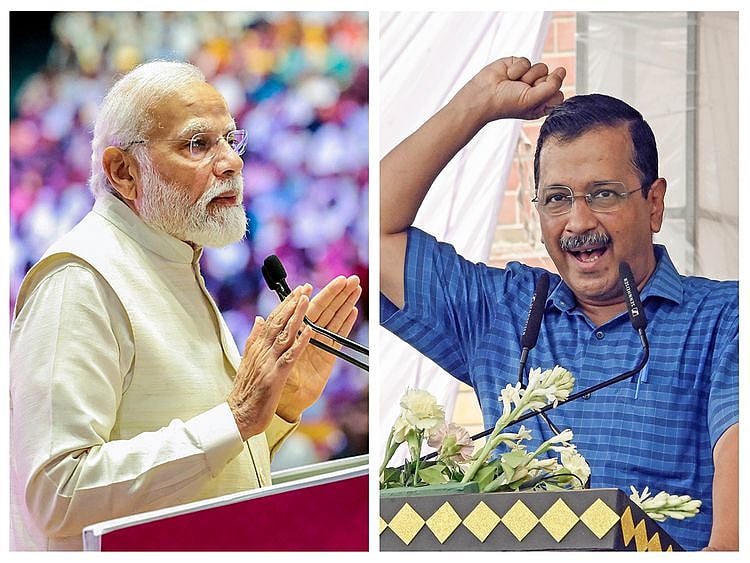Decoding Delhi’s Power Play: A new chapter unfolds
Delhi Services Bill: In India, Modi wins this round vs Kejriwal

Parliament of India’s nod to Government of National Capital Territory of Delhi (Amendment) Bill 2023 is game and set to the centre in its power tussle with the elected AAP government in Delhi. The match though may not be over. Also called the Delhi Services Bill, it now awaits the President’s nod, a mere formality, to become an Act.
Naveen Patnaik’s Biju Janata Dal from Odisha and the ruling YSRCP in Andhra Pradesh pushed back against opposition unity with nine MPs each to help the passage of the bill and NDA cross the numbers in the upper house of Parliament.
If the two parties are hoping for a quid pro quo of some sort in the future, they need look only as far as the beleaguered Arvind Kejriwal who supported the BJP government over the abrogation of article 370 that scrapped Jammu and Kashmir’s special status and demoted it to a union territory four years ago.
Or perhaps BJP leader Meenakshi Lekhi’s comments in Parliament asking an opposition MP to ‘keep quiet else ED may visit your home’ worked as a timely warning to the two parties!
The power tussle in the capital which does not have the often bandied ‘double engine’ government has been a see-saw public battle for the last eight years often, at the cost of the voter since Arvind Kejriwal took oath for the first of his two terms in February 2015.
With law, public order, and land under the direct control of the centre, three months later a home ministry notification gave the centre-appointed LG power over the postings and transfers of bureaucrats as well.
Fight in courts and outside
The bitter battle has since then been fought in courts and outside with clashes on issues as diverse as teachers training and free yoga classes.
Through the squabbling between Kejriwal and the LG, centre’s intent was clear as far back as May when it clashed with the Supreme Court and issued an ordinance to replace the apex court’s directive giving back the Delhi government authority over services in the capital city, this included control over bureaucrats.
With this move the centre appointed Lieutenant Governor is back in the saddle with sweeping powers in the union territory, the final word even if Kejriwal unexpectedly gets his way in the newly formulated 3-member National Capital Civil Services Authority (NCCSA) of which he is likely to be a minority or even an absentee member despite being the chairperson.
As per the Bill, ‘quorum for the meeting of NCCSA shall be of two members,’ in other words a meeting can be convened without chief minister Kejriwal’s attendance making his government toothless. The BJD and YSRCM will do well to note the bad precedent this sets, of erosion of federalism and powers of an elected chief minister.
In the heated debate in Parliament as the opposition questioned the constitutional validity of the centre’s move another controversial frontier was opened.
Doctrine of basic structure
Former CJI Ranjan Gogoi in his maiden speech in three years of being a member of parliament not only called the Bill “Perfectly legitimately valid, correct and right” but also questioned the constitution itself saying, “the doctrine of basic structure of the Constitution has a very debatable jurisprudential basis.”
Ironically Gogoi who was nominated to the Rajya Sabha barely four months after his retirement had invoked the same basic structure of the Constitution while settling crucial cases during his tenure.
Gogoi’s remarks questioning Constitution’s validity itself have been dismissed by chief justice Chandrachud who headed the bench that had earlier restored powers over administrative services to the AAP government, a judgement that has now been bypassed by the centre.
The CJI has rejected Gogoi’s utterances in parliament as an ‘opinion not a diktat’ but the confrontation between the executive and judiciary is far from over.
Gogoi is not new to controversy, he faced sexual harassment allegations from a member of his staff during his stint as the country’s top judge and four women MPs walked out on his speech. The inquiry panel found ‘no substance’ in the allegations, the bench that heard the matter Suo moto was headed by Gogoi himself. Make what you want of that.
Battlelines have been redrawn
In sharp contrast was the moving image of a visibly frail former prime minister Manmohan Singh in parliament. Singh who turns 91 next month was in a wheelchair and sat through the six-hour long proceedings to cast his vote.
History should be kinder to a man who as an economist laid the road map for India, his silent demeanour that was often mocked dwarfing shrill monotones and degenerative debates that parliament witnesses today.
The battlelines have been redrawn and in the countdown to elections, no inch will be given. From the removal of statehood of J&K to taking over the administrative powers in the national capital, decentralisation is under spotlight. Without an opposition in cohesion, it could a question of what next.
Network Links
GN StoreDownload our app
© Al Nisr Publishing LLC 2026. All rights reserved.